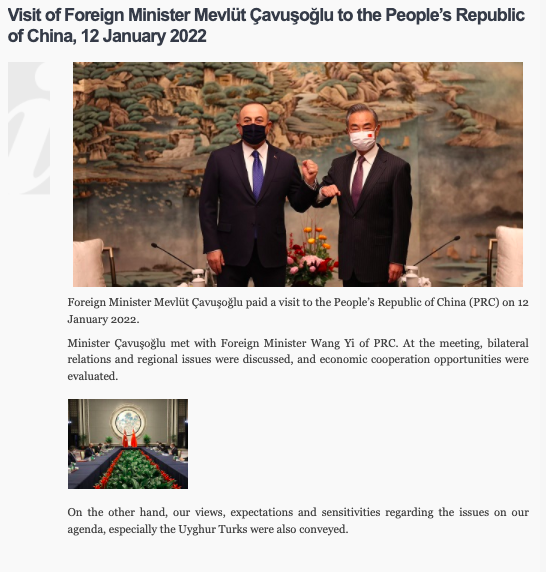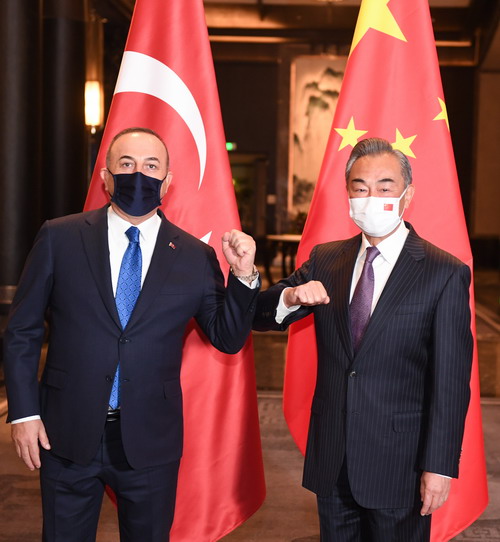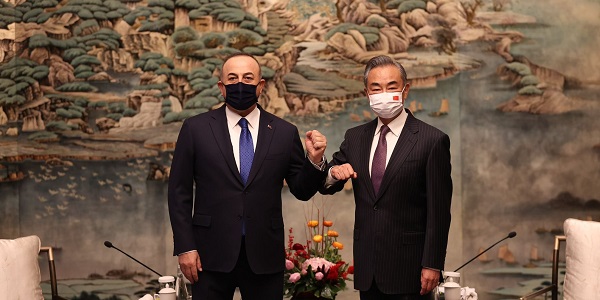Levent Kenez/Stockholm
The Turkish government has not been giving detailed or satisfying information to the public about its relations with China for a while now. Ankara, which is increasingly dependent on China economically, is silent about the human rights violations of Uyghur Muslims in Xinjiang. Nordic Monitor research has found details Foreign Minister Mevlüt Çavuşoğlu has neglected to mention about his trip to Beijing last week, when Turkey reassured China that Xinjiang-related issues will not pose a threat to bilateral relations.
Çavuşoğlu paid a visit to China on January 12. The entire official statement made by the Turkish side regarding the visit consists of two sentences.
“At the meeting, bilateral relations and regional issues were discussed, and economic cooperation opportunities were evaluated. On the other hand, our views, expectations and sensitivities regarding the issues on our agenda, especially the Uyghur Turks were also conveyed,” a statement from the Turkish Ministry of Foreign Affairs reads. Çavuşoğlu also shared the same passage on Twitter.

However, unlike the Turkish side, the Chinese issued a broad official statement about what was discussed during the visit. In a statement on the Chinese Foreign Ministry website on January 12, Chinese Foreign Minister Wang Yi confirmed that he had diplomatically given Çavuşoğlu a message not to interfere in China’s internal affairs.
“I have the following hopes for both sides. First, support each other in safeguarding respective sovereignty, security and development interests. Second, abide by non-interference in each other’s internal affairs, a basic norm of international relations. Third, not participate in activities against each other on international occasions. Fourth, strengthen communication and enhance mutual understanding on cognitive differences in issues such as history and ethnic groups through bilateral channels,” Wang told Çavuşoğlu, according to the ministry statement.
The following day, answering a question about Çavuşoğlu’s visit from Shenzhen TV at a regular press conference, Foreign Ministry spokesperson Wang Wenbin again conveyed the details of the meeting with Çavuşoğlu.
“Foreign Minister Çavuşoğlu said that the Turkish side is committed to the one-China principle and will not allow violent terrorist acts targeting China or anti-China activities that harm China’s territorial integrity on Turkish soil. The Turkish side never uses Xinjiang-related issues as a tool against China and has long designated the ETIM (East Turkistan Islamic Movement) as a terrorist organization and banned its activities in Turkey,” spokesperson Wang told reporters.

Turkish President Recep Tayyip Erdoğan during his two-day official visit to China in 2015 stated that he had long considered the East Turkestan Islamic Movement (ETIM) a terrorist organization. Apart from that, Turkey has not made any official statement about whether it considers ETIM a terrorist organization or not.
In 2020 the US removed ETIM from its terrorist list on the basis that “there has been no credible evidence that ETIM continues to exist.” China accused the US of double standards, while Washington contends that the label has been broadly misused to oppress Muslims, including ethnic Uyghurs in Xinjiang.
What Çavuşoğlu did not share about the trip is that he criticized the diplomatic boycott decision of some countries regarding the Winter Olympics, which are to be held in Beijing between February 4 and 20, no doubt an attitude of support for the host country. According to Minister Wang, the Turkish side stated that it fully agrees that sports should not be politicized.
The United States, Australia, the United Kingdom, New Zealand, Canada and Lithuania have announced a diplomatic boycott of the competition, which means they will allow their athletes to compete but there will be no diplomatic representation during the games. Countries participating in the boycott declare that it is a response to concerns about China’s human rights practices, especially in Xinjiang, where at least 1 million Uyghurs and other ethnic minorities have been subjected to involuntary detention in what China labels “reeducation camps.”
Turkey is suffering from a serious foreign exchange problem under increasingly difficult economic conditions. Therefore, the Turkish central bank has made swap deals with China, Qatar and South Korea worth about $23 billion in recent years. Turkey encourages trade in local currencies to prevent the depletion of reserves, which is why his Chinese counterpart reminded Çavuşoğlu of the swap agreement in June.
“We should make good use of the renminbi-Turkish lira swap arrangement, seek greater synergy between our development strategies, advance landmark projects in fields such as nuclear power, and expand cooperation in new energy, 5G, cloud computing, big data and other fields,” Wang said, according to the ministry statement.
For decades, Turkey has assisted and defended the Uyghurs, who share many cultural and linguistic traits with Turks and are seen as ethnic brethren by Turkish nationalists. But Turkey’s ruling Justice and Development Party (AKP) changed this policy in 2019 and deported several Uyghurs to China. Moreover, as international condemnation increases over China’s crackdown on Uyghurs in Xinjiang province, Turkey has remained silent due to China’s economic and political influence. Moreover, the Turkish government refused to join 23 nations in joint a statement calling on China to end violations against its Uyghur minority at the United Nations in 2020.
Turkey has been deporting or or refusing to allow Uyghur activists to enter the country since 2019 to avoid a reaction from China. Proposals in the Turkish parliament that condemn China or establish a parliamentary research commission on the Uyghurs are systematically rejected by the votes of the Islamist ruling party. A Turkey-China extradition agreement that was signed in 2017 is still awaiting ratification by the Turkish parliament. While the Erdoğan government has not put the agreement into the ratification process due to possible adverse reactions at home, it continues to deport the Uyghurs.
Most recently, Dolkun İsa, leader of the World Uyghur Congress, was denied entry to Turkey in September. İsa had to return to Germany, where he resides.












